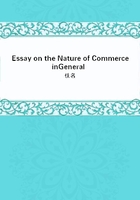
第13章
All Classes and Individuals in a State subsist or are enriched at the Expense of the Proprietors of Land There are none but the prince and the proprietors of land who live independent; all other classes and inhabitants are hired or are undertakers. The proof and detail of this will be developed in the next chapter.
If the prince and proprietors of land close their estates and will not suffer them to be cultivated it is clear that there would be neither food nor rayment for any of the inhabitants; consequently all the individuals are supported not only by the produce of the land which is cultivated for the benefit of the owners but also at the expense of these same owners from whose property they derive all that they have.
The farmers have generally two thirds of the produce of the land, one for their costs and the support of their assistants, the other for the profit of their undertaking: on these two thirds the farmer provides generally directly or indirectly subsistence for all those who live in the country, and also mechanics or undertakers in the city in respect of the merchandise of the city consumed in the country.
The proprietor has usually one third of the produce of his land and on this third he maintains all the mechanics and others whom he employs in the city as well, frequently, as the carriers who bring the produce of the country to the city.
It is generally calculated that one half of the inhabitants of a kingdom subsist and make their abode in cities, and the other half live in the country; on this supposition the farmer who has two thirds or four sixth of the produce of the land, pays either directly or indirectly one sixth to the citizens in exchange for the merchandise which he takes from them. This sixth with the one third or two sixths which the proprietor spends in the city makes three sixths or one half of the produce of the land. This calculation is only to convey a general idea of the proportion; but in fact, if half of the inhabitants live in the cities they consume more than half of the land's produce, as they live better than those who reside in the country and spend more of the produce of the land being all mechanics or dependents of the proprietors and consequently better maintained than the assistants and dependents of the farmers.
But let this matter be how it will, if we examine the means by which an inhabitant is supported it will always appear in returning back to the fountain head, that these means arise from the land of the proprietor either in the two thirds reserved by the farmer, or the one third which remains to the landlord.
If a proprietor had only the amount of land which he lets out to one farmer the farmer would get a better living out of it than himself; but the nobles and large landowners in the cities have sometimes several hundreds of farmers and are themselves very few in number in proportion to all the inhabitants of a state.
True there are often in the cities several undertakers and mechanics who live by foreign trade, and therefore at the expense of foreign landowners: but at present I am considering only a state in regard to its own produce and industry, not to complicate my argument by accidental circumstances.
The land belongs to the proprietors but would be useless to them if it were not cultivated. The more labour is expended on it, other things being equal, the more it produces; and the more its products are worked up, other things being equal, the more value they have as merchandise. Hence the proprietors have need of the inhabitants as these have of the proprietors; but in this economy it is for the proprietors, who have the disposition and the direction of the landed capital, to give the most advantageous turn and movement to the whole. Also everything in a state depends on the fancy, methods, and fashions of life of the proprietors of land in especial, as I will endeavour to make clear later in this essay.
It is need and necessity which enable farmers, mechanics of every kind, merchants, officers, soldiers, sailors, domestic servants and all the other classes who work or are employed in the state, to exist. All these working people serve not only the prince and the landowners but each other, so that there are many of them who do not work directly for the landowners, and so it is not seen that they subsist on the capital of these proprietors and live at their expense. As for those who exercise professions which are not essential, like dancers, actors, painters, musicians, etc. they are only supported in the state for pleasure or for ornament, and their number is always very small in proportion to the other inhabitants.